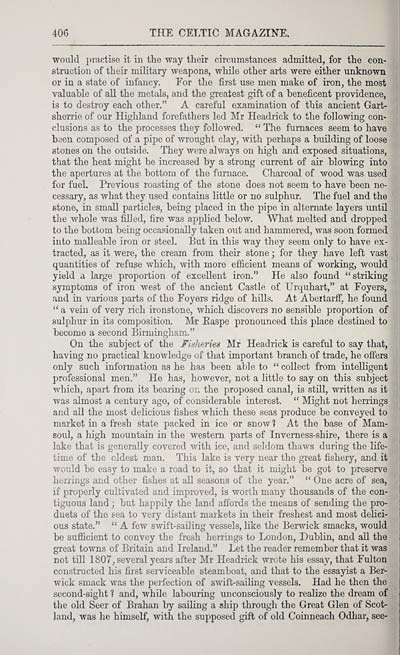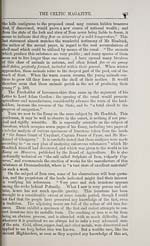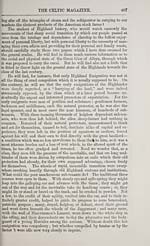Blair Collection > Celtic magazine > Volume 4
(416)
Download files
Complete book:
Individual page:
Thumbnail gallery: Grid view | List view

406 THE CELTIC MAGAZINE.
would practise it in the way their circumstances admitted, for the con-
struction of their military weapons, while other arts were either unknown
or in a state of infancy. For the first use men make of iron, the most
valuable of all the metals, and the greatest gift of a beneficent providence,
is to destroy each other." A careful examination of this ancient Gart-
sherrie of our Higliland forefathers led Mr Headrick to the following con-
clusions as to the processes they followed. " The furnaces seem to have
baen composed of a pipe of wrought clay, with perhaps a building of loose
stones on the outside. They were always on high and exposed situations,
that the heat might be increased by a strong current of air blowing into
the apertures at the bottom of the furnace. Charcoal of wood was used
for fuel. Previous roasting of the stone does not seem to have been ne-
cessary, as what they used contains little or no sulphur. The fuel and the
stone, in smaU particles, being placed in the pipe in alternate layers until
the whole was filled, fire was applied below. What melted and dropped
to the bottom being occasionally taken out and hammered, was soon formed
into malleable iron or steel. But in this way they seem only to have ex-
tracted, as it were, the cream from their stone ; for they have left vast
quantities of refuse which, with more efiicient means of working, would
yield a large proportion of excellent iron." He also found "striking
symptoms of iron west of the ancient Castle of TJrquhart," at Foyers,
and in various parts of the Foyers ridge of hills. At Abeitarfi", he found
" a vein of very rich ironstone, which discovers no sensible proportion of
sulphur in its composition, Mr Kaspe pronounced this place destined to
become a second Birmingham."
On the subject of the Fisheries Mr Headrick is careful to say that,
having no practical knowledge of that important branch of trade, he ofters
only such information as he has been able to " collect from intelligent
professional men." He has, however, not a little to say on this subject
which, apart from its bearing on the proposed canal, is still, written as it
was almost a century ago, of considerable interest. " Might not herrings
and all the most delicious fishes which these seas produce be conveyed to
market in a fresh state packed in ice or snow 1 At the base of Mam-
soul, a high mountam in the western parts of Inverness-shire, there is a
lake that is generally covered with ice, and seldom thaws during the life-
time of the oldest man. This lake is very near the great fishery, and it
would be easy to make a road to it, so that it might be got to preserve
herrings and other fishes at all seasons of the year," " One acre of sea,
if properly cultivated and improved, is worth many thousands of the con-
tiguous land ; but happily the land affords the means of sending the pro-
duets of the sea to very distant markets in their freshest and most delici-
ous state," " A few swift-sailing vessels, like the Berwick smacks, would
be sufiicient to convey the fresh herrings to London, Dublin, and all the
great towns of Britain and Ireland," Let the reader remember that it was
not till 1807, several years after Mr Headrick wrote his essay, that Fulton
constructed his first serviceable steamboat, and that to the essayist a Ber-
wick smack was the peifection of swift-sailing vessels. Had he then the
second-sight ? and, while labouring unconsciously to realize the dream of
the old Seer of Brahan by sailing a ship through the Great Glen of Scot-
land, was he himself, with the supposed gift of old Coinneach Odhar, see-
would practise it in the way their circumstances admitted, for the con-
struction of their military weapons, while other arts were either unknown
or in a state of infancy. For the first use men make of iron, the most
valuable of all the metals, and the greatest gift of a beneficent providence,
is to destroy each other." A careful examination of this ancient Gart-
sherrie of our Higliland forefathers led Mr Headrick to the following con-
clusions as to the processes they followed. " The furnaces seem to have
baen composed of a pipe of wrought clay, with perhaps a building of loose
stones on the outside. They were always on high and exposed situations,
that the heat might be increased by a strong current of air blowing into
the apertures at the bottom of the furnace. Charcoal of wood was used
for fuel. Previous roasting of the stone does not seem to have been ne-
cessary, as what they used contains little or no sulphur. The fuel and the
stone, in smaU particles, being placed in the pipe in alternate layers until
the whole was filled, fire was applied below. What melted and dropped
to the bottom being occasionally taken out and hammered, was soon formed
into malleable iron or steel. But in this way they seem only to have ex-
tracted, as it were, the cream from their stone ; for they have left vast
quantities of refuse which, with more efiicient means of working, would
yield a large proportion of excellent iron." He also found "striking
symptoms of iron west of the ancient Castle of TJrquhart," at Foyers,
and in various parts of the Foyers ridge of hills. At Abeitarfi", he found
" a vein of very rich ironstone, which discovers no sensible proportion of
sulphur in its composition, Mr Kaspe pronounced this place destined to
become a second Birmingham."
On the subject of the Fisheries Mr Headrick is careful to say that,
having no practical knowledge of that important branch of trade, he ofters
only such information as he has been able to " collect from intelligent
professional men." He has, however, not a little to say on this subject
which, apart from its bearing on the proposed canal, is still, written as it
was almost a century ago, of considerable interest. " Might not herrings
and all the most delicious fishes which these seas produce be conveyed to
market in a fresh state packed in ice or snow 1 At the base of Mam-
soul, a high mountam in the western parts of Inverness-shire, there is a
lake that is generally covered with ice, and seldom thaws during the life-
time of the oldest man. This lake is very near the great fishery, and it
would be easy to make a road to it, so that it might be got to preserve
herrings and other fishes at all seasons of the year," " One acre of sea,
if properly cultivated and improved, is worth many thousands of the con-
tiguous land ; but happily the land affords the means of sending the pro-
duets of the sea to very distant markets in their freshest and most delici-
ous state," " A few swift-sailing vessels, like the Berwick smacks, would
be sufiicient to convey the fresh herrings to London, Dublin, and all the
great towns of Britain and Ireland," Let the reader remember that it was
not till 1807, several years after Mr Headrick wrote his essay, that Fulton
constructed his first serviceable steamboat, and that to the essayist a Ber-
wick smack was the peifection of swift-sailing vessels. Had he then the
second-sight ? and, while labouring unconsciously to realize the dream of
the old Seer of Brahan by sailing a ship through the Great Glen of Scot-
land, was he himself, with the supposed gift of old Coinneach Odhar, see-
Set display mode to: Large image | Transcription
Images and transcriptions on this page, including medium image downloads, may be used under the Creative Commons Attribution 4.0 International Licence unless otherwise stated. ![]()
| Early Gaelic Book Collections > Blair Collection > Celtic magazine > Volume 4 > (416) |
|---|
| Permanent URL | https://digital.nls.uk/76556991 |
|---|
| Description | Volume IV, 1879. |
|---|---|
| Shelfmark | Blair.5 |
| Attribution and copyright: |
|
| Description | A selection of books from a collection of more than 500 titles, mostly on religious and literary topics. Also includes some material dealing with other Celtic languages and societies. Collection created towards the end of the 19th century by Lady Evelyn Stewart Murray. |
|---|
| Description | Selected items from five 'Special and Named Printed Collections'. Includes books in Gaelic and other Celtic languages, works about the Gaels, their languages, literature, culture and history. |
|---|

